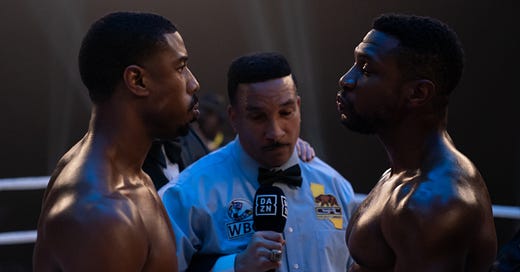You’re reading Boy Movies, a weekly newsletter written by an idiot who was so categorically and cataclysmically wrong about my prediction for Best Actor at this year’s Academy Awards that I had to take last week off in shame. Still, I survived another Oscar season, and now I can return to my mission of trying to take this operation global. Do your part by subscribing and telling a friend.
Jonathan Majors, graduate from the Tom Hardy school of mumble acting
“What feelings do men experience?” There were some stunning replies to this tweet — “homosexuality,” “a yearning for the mines,” “southeast” — and I thought of it frequently while watching Creed III. I was skeptical about this film, as many were: Creed is famously extremely good while Creed II is, comparatively, kind of dogshit. I wasn’t confident in the concept of Michael B. Jordan as a first-time director, for no real reason aside from the fact that I sort of roll my eyes every time a beautiful actor is like, “Time for me to direct.…
Keep reading with a 7-day free trial
Subscribe to Boy Movies to keep reading this post and get 7 days of free access to the full post archives.



